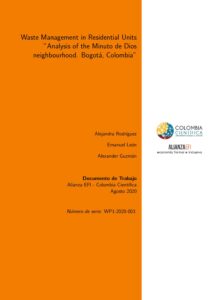Economic development continues to be driven by various forms of consumption, causing the exponential generation of waste largely from households whose inadequate management also affects the work of the informal waste picker. Thus, this study analyses the case of the town of Engativá in the city of Bogotá where there is serious concern about waste management. A sample of 10 residential units in the Minuto de Dios neighbourhood was considered in order to analyse the management, separation, classification and disposal of household waste, the incentives that the residential units have to implement and strengthen waste management, and the consequences that these behaviours have on the informal waste picker. This research was approached from a qualitative approach with the identification and characterisation of residential units located in the area under study. The results were obtained by conducting interviews with managers of the residential units. The main findings include a low percentage of units with a waste management plan, partly because they do not know how to implement it or do not have adequate resources and infrastructure. There is great concern about the low culture and awareness of residents in waste management and the marked indifference towards waste pickers that marginalises their activity. This study highlights the importance of addressing cultural and social reasons that continue to limit adequate waste disposal, deepening the scope of public policies on waste management and implementing strategies that create trust between residents, managers and waste pickers so that the latter have the opportunity to dignify their work through recognition and support from households in adequate waste separation.
Autores:
- Alejandra Rodríguez Rodríguez
- Brayan Alexander Guzmán Azuero
- Emanuel León Ruíz
Palabras clave:
- Household waste
- Informal recycler
- Residential units
- Solid waste management
Categorías:
- Proyecto 1
- Documentos de trabajo
